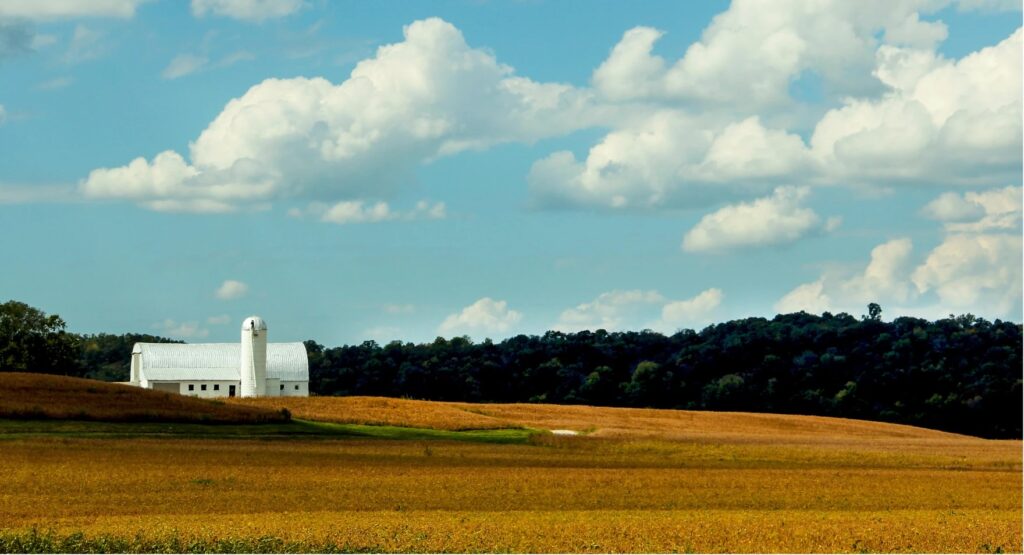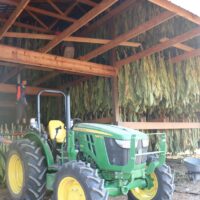The total number of Kentucky farms dropped by 20% in the span of two decades – with the latest U.S. Department of Agriculture data showing a loss of over 1.4 million acres of farmland in a little more than two decades’ time.

A new Kentucky Farm Bureau initiative aims to curb the loss of farmland moving forward by offering tools and information to farmers and landowners that enable them to more smoothly facilitate the transition of farmland between hands.
KFB announced it was implementing the Kentucky Farmland Transition Initiative (KFTI) last month. The KFTI campaign is designed to not only educate farmers and landowners about the transferral of farmland but also lobby for more state level incentives to keep farmland active.
Eddie Melton, KFB’s current president, is a fifth-generation farmer. He grew up on and operates a farm near the Western Kentucky town of Sebree in Webster County, and said he’s passionate about preserving the state’s farming industry.
“This initiative has been something that I’ve been passionate about … (launching) as we lose farmland,” said Melton, who was elected to his leadership position in 2023. “If you project about how many farmers we’re losing … we could lose half of our farms in the next 60 years.”
Farmland in the state of Kentucky has been on the decline in recent decades. At the time of the 2002 USDA Census of Agriculture, more than 13.8 million acres of land was devoted to farming in the Bluegrass State – spread across over 86,000 farms. In 2022, there were fewer than 70,000 farms on around 12.4 million acres – representing a loss of around 10% of the state’s farmland.
Issues some industry experts connect with the land loss include, the shifting demographics of the people who choose to work in the farming industry and the financial pressures faced when inheriting farmland in the state.
The average age of farmers in the United States recently went up – increasing from 56 to 57 and a half years old. A 2022 survey conducted by the National Young Farmers Association found that some of the biggest challenges for young farmers include “access to farmland and capital, student loan debt, access to healthcare, affordable housing and the increasing impacts of climate change.”
- RELATED: America’s farmers are getting older, and young people aren’t rushing to join them
- RELATED: The average age of farmers is going up. Kentucky’s young agricultural producers say it’s out of their control.
Matt Adams, a first generation farmer in Hardin County, said that the agriculture industry is a difficult one to break into.
“I was lucky enough that I had a neighbor and a gentleman here that helped me get started and helped us purchase our initial farm … but that’s not the case for everyone,” Adams said.
Adams said he’s seen several farms in the area near his go dormant, get divided up or be put to non-agricultural use over the years.
“Every time that a farm is dispersed here or sold, either because someone retires or a death in the family and settling an estate, it seems like a lot of times those farms will go to auction and they’ll be (divided) up into smaller tracts … [and] once it’s split up, it really never gets put back together.”
Adams said that another factor in the ebbing of Kentucky farmland is the economics of transition – and a lack of incentives to keep using the land for agricultural purposes. Though Kentucky has not had an estate tax since 2005, the financial burden of inheriting an agricultural enterprise can be daunting, leaving auctions the only viable option for some.
“Of course, everything kind of revolves around the dollar,” Adams said. “If there’s some financial incentives that could be put in place at the state level to encourage some people to leave some of this land in agricultural production instead of selling it for the possibility of development? That (would) definitely help, as well.”
The Kentucky Farm Bureau aims to lobby for policies and programs that can help out farmers – and preserve farmland – at the state level in the future.
Melton said the focus of the KFTI currently is to engage in a dialogue with farmers and hopeful up-and-coming farmers throughout the state to better understand the barriers blocking their paths to agricultural production.
Farmers and other agricultural producers can share their stories and suggestions to improve the initiative with KFB online.
This story is republished with permission from WKMS. Read the original.






